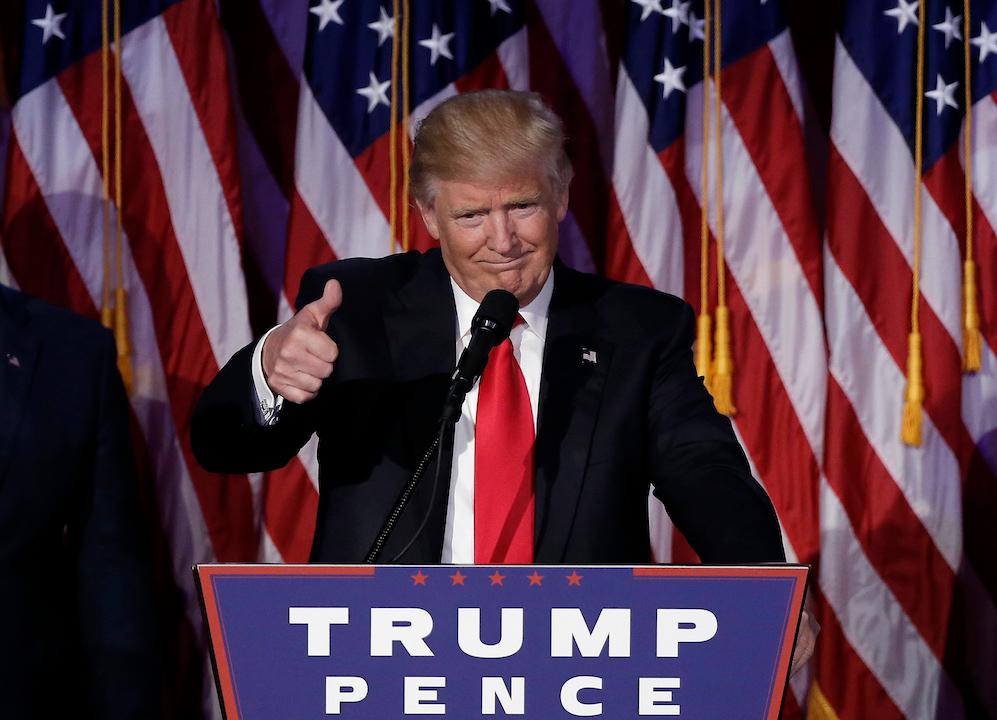Donald Trump is the next president of the United States
U.S. President-elect Donald Trump greets supporters during his election night rally in Manhattan.
Stay tuned here for ongoing coverage of the US election, brought to you by PRI's The World, Global Nation and Across Women's Lives.
Just getting here? Check out these highlights:
- Donald Trump has won the United States' presidential election.
- In his victory speech, he thanked Hillary Clinton and called for unity.
- Several women won their races and made history.
- The world's financial markets plunged as the result became clear.
- Political cartoonists are inspired today. All over the world.
UPDATE: 11/9/16 10:45 AM EST
This live blog is now closed
Thanks for staying with us here, folks. Keep up with our reporting on the US election on the PRI.org homepage, and on our social media accounts:
PRI's The World on Facebook and Twitter
UPDATE: 11/9/16 8:10 AM EST
Things that happened while you were watching the election
Let’s not forget that the world didn’t stop just because the US was busy exercising its democracy. Here’s a round-up of what else has gone on around the planet in the past 12 hours.
- The US-led coalition in Syria killed at least 16 civilians, according to observers. The Syrian Observatory for Human Rights says that a child was among the bystanders hit by an airstrike on the village of al-Heisha, north of Raqqa.
- India pulled its biggest bank notes out of circulation. With immediate effect, Prime Minister Narendra Modi announced, 500 and 1,000 rupee bills – worth around $7.50 and $15 – will become worthless. It’s a bid to tackle counterfeiting and corruption.
- Pakistan deported Sharbat Gula – the “Afghan Girl” memorably featured on an iconic cover of National Geographic – to her home country. Gulla was convicted of carrying a fake ID card and staying in Pakistan illegally.
- Italy moved to make naming babies fairer. Its constitutional court judged that a longstanding rule which means that children automatically receive their father’s surname if their parents are married is discriminatory to women.
- In Brazil, public workers stormed Rio de Janeiro’s assembly building. They’re angry at plans to cut their salaries in a bid to tackle millions of dollars of unpaid debt.
- China handed a suspended death sentence to the head of the company involved in the explosion of a warehouse in Tianjin last year. The blast killed 173 people. Investigators found that the building had been used to store chemicals illegally.
- A tram overturned in the south of London, killing an unknown number of people and injuring more than 50 others. British emergency services are still working to free those trapped.
- This injured elephant was rescued in India. The animal fractured its leg three months ago and has now been lifted to a rehabilitation center outside Bengalaru, where it will be helped to recover. Because, elephants.

UPDATE: 11/9/16 6:50 AM EST
This was actually a not-entirely-horrible election night for women
So Hillary Clinton didn’t win the presidency, but plenty of other women had a better election night.
Our friends at Across Women’s Lives have been sharing the good news:
UPDATE: 11/9/16 3:10 AM EST
'America will no longer settle for anything but the best'
Donald Trump has just finished delivering his victory speech in New York. It was triumphant but also conciliatory: He began by thanking Hillary Clinton, to whom he said the country owned "a major debt of service," then promised to be "president for all Americans."
"America will no longer settle for anything but the best," he said. "We must reclaim our country's destiny and dream big and bold and daring."
UPDATE: 11/9/16 2:40 AM EST
President-Elect Donald Trump: It’s official
The Associated Press has called the election for Donald Trump. He will be the 45th president of the United States.
UPDATE: 11/9/16 1:30 AM EST
Are we looking at a ‘black swan’ election?
As Donald Trump appears to take the lead, one phrase commentators keep coming back to is “black swan election.”
No, it’s nothing to do with Natalie Portman in a tutu (more’s the pity). It refers to a theory developed by Lebanese-American thinker Nassim Nicholas Taleb: He cites a Latin expression about something being “as rare as a black swan.” At the time, no one thought black swans existed. Except that they do.
In other words: Something that everyone thought was impossible might be entirely possible.
You probably get the metaphor by now.
UPDATE: 11/8/16 11:40 PM EST
Brexit, take 2? The world’s markets think so
With the battleground states of Ohio and Florida called for Donald Trump, and North Carolina looking likely, the world’s financial markets are contemplating the possibility that he might actually win this thing. And by “contemplating,” I mean “panicking wildly at.”
Here’s a snapshot of what's happening right now:
American and European markets are closed, but futures for the Dow Jones Industrial Average are down to the tune of somewhere around 4 percent. Likewise futures for the S&P 500. Oil is losing value, too.
Meanwhile the Mexican peso is currently the lowest it has ever been against the dollar. The currency has lost nearly 12 percent in the past few hours. That’s because a Trump White House would cancel Mexico’s free trade agreements with the US, not to mention make it pay to build a massive border wall.
The only big winner right now is gold: the “safe-haven” commodity has jumped nearly 4 percent. Nervous investors are also banking on silver, sovereign bonds and the Japanese yen.
It’s deja vu for analysts who watched markets nosedive after the UK surprised most by voting to leave the European Union. Election Night is already being compared to a “second Brexit.”
UPDATE: 11/8/16 10:05 PM EST
Watching the results with the world's future policy markers
PRI producer Bradley Campbell is watching results come in at the Harvard Kennedy School, alma mater to heads of state, elected officials and policy makers the world over. What's the mood like among the next generation of public servants?
Packed crowd at Harvard's John F. Kennedy School of Government. Balloons inflated overhead and ready to, hopefully, drop. CNN on television screens throughout the auditorium and the voice of Wolf Blitzer keeping students entertained with the near constant phrase, "Nail biter."
Many of the students here are on Apple laptops and smartphones following minute-by-minute updates from the New York Times and FiveThirtyEight. I've never seen so many website refreshes. It's like they want the internet to speed up.
But the best thing I'm seeing tonight? Numerous students of all races and colors and sexes and ages with 'I voted' stickers on their shirts. I talked with one first-time voter from Louisiana. He was pretty succinct with what voting in his first presidential election was like: "Cool."
Cool indeed.
UPDATE: 11/8/16 9:00 PM EST
Racist taunts test a friendship
For 18-year-old Thu McKenzie, politics took an especially ugly turn on campus one night last week, following a rally for Republican Donald Trump.
McKenzie, a student at the University of Wisconsin, Eau Claire, was heading out of class when a group of Trump supporters ganged up on her. They taunted the biochemistry major, who was born in Vietnam, using racial slurs — telling her to go back to her “home country," and perhaps most offensively, “Ching Chong Asians for Trump!”

McKenzie, shaken by the interaction, texted her friend and lab partner, Madison Bau, letting her know she needed some space. After all, Bau was among the throngs of Trump cheerleaders. McKenzie, who is pulling for Hillary Clinton tonight, also posted about the disturbing experience on Facebook.
Bau was disappointed in her peers, treating McKenzie that way, and she wished that her friend had felt comfortable enough to talk to her about it.
However, both women say none of this will get in the way of their friendship. They think their generation has the potential to bring people together, including even political polar opposites.
— Joyce Hackel. Read her full story here.UPDATE: 11/8/16 8:45 PM EST
Getting Latinos to the polls — it's all about the outreach
A Latino Decisions study on the eve of elections found that 35 percent of 5,600 likely Latino voters surveyed were contacted by political parties or organizations asking them to vote or register to vote. In battleground states like Colorado, Florida, North Carolina, Nevada and Ohio, 40 to more than 50 percent of voters said they were contacted.
Those contacted were more likely to have heard from the Democratic Party or Democratic candidates than from Republicans. Immigration and the economy topped the list of things Latino voters said they cared about most. The survey found that almost 80 percent of likely Latino voters supported Hillary Clinton. The group has been releasing more data throughout the evening via its Twitter account.
"The Donald Trump effect has kept Latinos engaged," said Sylvia Manzano of Latino Decisions. "But he didn't go and register people. There are people who were going and doing that work on the ground."
In the Global Nation Exchange, our Facebook discussion group about immigration, Juan Freitez shared images of outreach efforts going on in Phoenix, Arizona, right now. His organization, LUCHA, is using a text messaging service to help answer any last minute questions voters may have.
Ben Monterroso, executive director of the civic engagement organization Mi Familia Vota joined the press call about the survey. "I'm very proud to say that we have been work for Latino political power for many years," he said. "We have seen how to organize on the ground, to make sure that this political power we're building is not just for one election."
See the results of the Latino Decisions survey in this PDF.
— Angilee Shah.
San Antonio kids have spoken
_0.jpeg&w=1920&q=75)
Above is Violet, newly minted class president of Mr. Mike's second grade class at the Circle School in San Antonio, Texas.
Her classmates just wrapped up schoolwide elections, both for class presidents and a mock election for US president. The students prepared questions for their class president candidates — and the candidates came ready with promises.
.jpeg&w=1920&q=75)
There are about 90 kids in the whole school, and here are their mock election results:
4 votes for Bernie Sanders
6 for Jill Stein
1 for Vermin Supreme (ed. note: oh my god, these kids)
8 for Donald Trump
54 for Hillary Clinton
But maybe you coulda guessed that from this kid’s hat.
.jpeg&w=1920&q=75)
— Maria Murriel and Isis Madrid. Isis reported from San Antonio. Read their full story here.
UPDATE: 11/8/16 8:00 PM EST
America First never really made sense
We've heard a lot this election cycle about “American exceptionalism,” and how America should go it alone in the world. "America First."
That's how it was in the good old days, right? Without foreign alliances and commitments.
Actually, no, says historian Larrie Ferreiro.
Ferreiro is author of an upcoming book titled "Brothers at Arms," about the international help that America depended on to achieve its independence from Britain during the Revolutionary War.
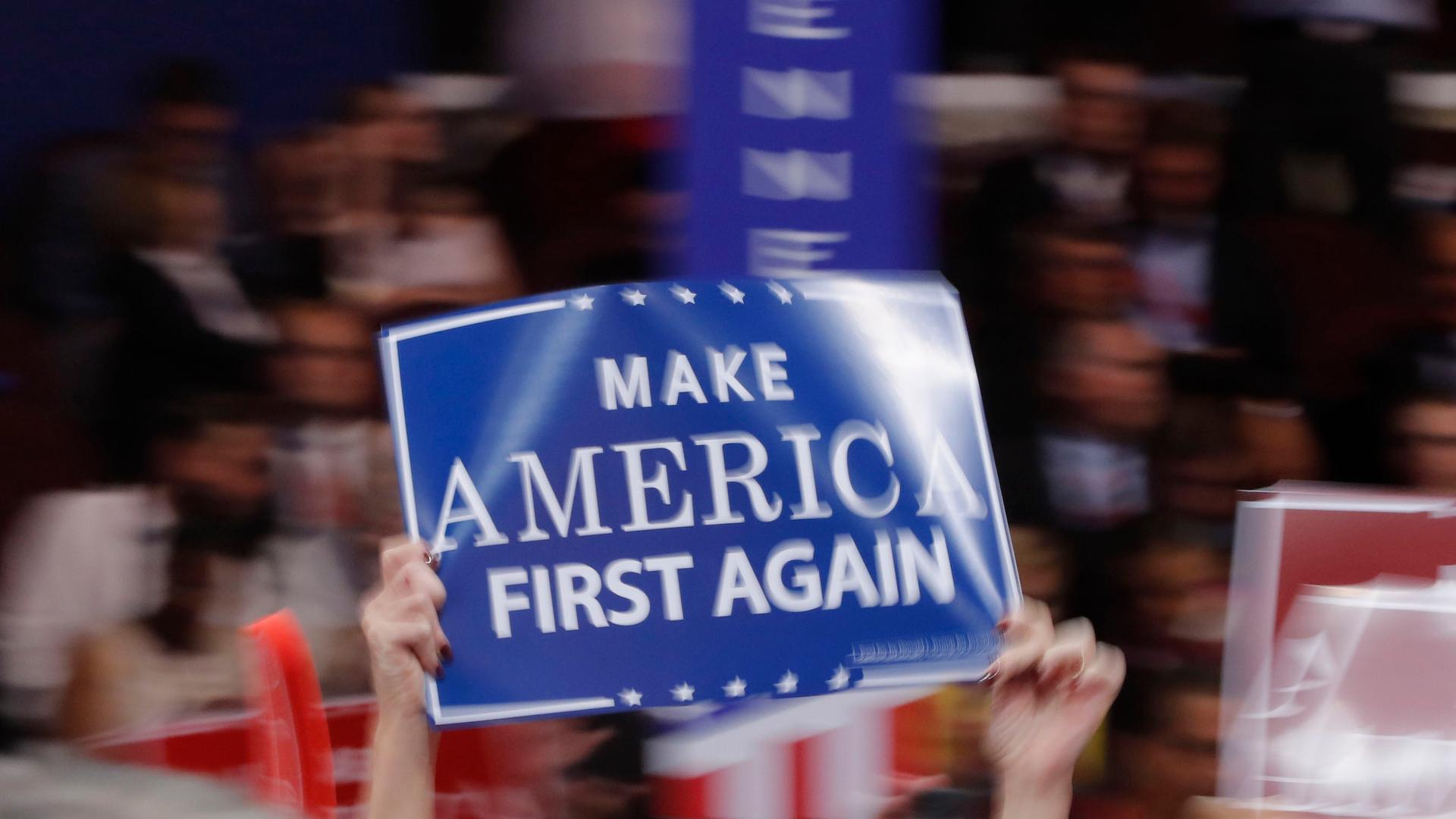
“'America First,' 'American greatness,' 'American exceptionalism.' These are all phrases that have been used in this campaign,” says Ferreiro, “and they’ve come to mean the idea of drawing up the bridge, separating America from the world. When in fact the original phrases meant something completely different.”
He says American exceptionalism has its roots in America’s role as a model and example to the world.
The phrase “American greatness” was first used in 1776, not long after the Declaration of Independence. A minister by the name of Timothy Dwight gave a valedictory address at Yale. He spoke about the foundations of American greatness “as Americans acting not as inhabitants of a small village, but rather as citizens of the world.”
— Christopher Woolf. Read his full story here.UPDATE: 11/8/16 7:45 PM EST
At COP22 in Morocco, climate geeks and locals are pulling for Clinton
Marrakech’s old walled city seems a long way from the battleground states that will determine the next president of the United States. But on Election Day in the US, thousands of people gathered there at this year’s UN climate change conference (COP22) are paying close attention to what happens across the Atlantic.
When it comes to climate change, there’s a clear policy divide between the candidates. Hillary Clinton wants to continue the climate agreements and policies President Barack Obama has signed on to, and Donald Trump wants to reverse course. For many attendees at COP22 that makes the choice a no-brainer: They’re with Clinton.
But some in attendance, including local Moroccans, aren’t just supporting her because they think she’ll be better for the environment.
“A woman in charge is better,” says Marie-Paul Lusaba, a conference-goer from the Democratic Republic of the Congo “because we are the one, we go in to fix things, and we are more effective.”
Other female conference attendees share Lusaba’s excitement about a woman in the White House. So do many Moroccan women.
“I’m proud of her,” says Fadela Abidoullah, a Moroccan college student volunteering at the climate conference who says she’s followed Clinton’s career since she was a kid.
She and her friend Mabrouka Aitsalah say no one in Morocco wants to see Trump win.
“We are women and we want women to win,” Aitsalah says.
— Susan Phillips in Marrakech. Read her full story here.UPDATE: 11/8/16 7:30 PM EST
Oh yeah, Russia loves Trump. Almost as much as it loves a divided America
Even to the casual observer, Russia's preference for a Donald Trump presidency has been apparent. There are the charges of Kremlin cyber-espionage against the Democratic National Committee by hackers Fancy Bear and Cozy Bear; the WikiLeaks drip of Clinton campaign emails that US intelligence says come giftwrapped courtesy of Russian secret services; and a relentlessly partisan Russian state media campaign that has promoted one candidate over another to audiences at home and abroad. (The one exception: a NSFW anti-Trump video by the band Pussy Riot.)
This is understandable.Trump's positions on key issues of the day — from Syria to Ukraine to NATO's expansion into Eastern Europe — dovetail, if not directly mirror, Russia's own policies. Trump has also called for improved relations with Moscow.
As one Russian analyst told me, "From the Kremlin's perspective, what's not to like?"
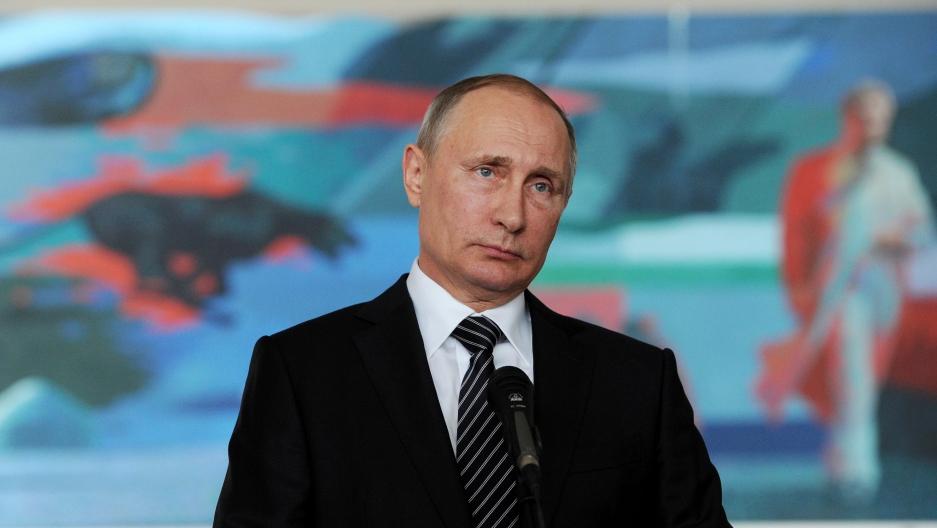
By contrast, Russian state media portrays Hillary Clinton as sick and ailing, corrupt and intent on grabbing power by any means possible. Most importantly, she is shown as virulantly anti-Russian.
Putin's antipathy to the Democratic nominee is well-known. In 2011, he accused Clinton, then US secretary of state, of "giving the signal" to thousands of Russians who protested rigged elections during the country's parliamentary elections. There's been a pile-up of negative coverage since. No wonder polls find Russians favor a Trump presidency nearly 3 to 1.
In the waning days of the campaign, state media has doubled down. Their message: If Trump is denied the presidency, it's because American democracy is corrupt and broken, incapable of acknowledging the people's will. The Kremlin likely never thought they could tip the race one way or another. It did, however, see opportunities to discredit the electoral system.
Would Russia prefer a Trump presidency? Probably. But an America divided and angry over a contested Clinton win also gives Russia more freedom to pursue its own interests. And so Russia's efforts to descredit these US elections sends different messages to different audiences. To Russians: American democracy is nothing to envy. To the next occupant of the White House: Who are you to judge?
— Charles Maynes in Moscow
UPDATE: 11/8/16 7:00 PM EST
This is a big day for US women
It's taken 240 years of nationhood to have a woman this close to taking the White House. And supporters of the first female presidential candidate, Democrat Hillary Clinton, have gone hard this historic Election Day.
The pro-Clinton internet is overflowing: Photos of grannies born before women could vote casting their ballots, selfies of women clad in feminist slogans, women gushing about taking their daughters to the polls — even if the kids are too young to vote, just so they could absorb the significance.
For the past week or so, Clinton supporters have been donning the candidate's signature pantsuits a sign of hoping the country gets its first female president. Millions have joined a secret Facebook #PantsuitNation.
And today in Rochester, New York, women especially have streamed to the grave of suffragette Susan B. Anthony to pay their respects.
Nations where it's statistically harder to be a woman, like Chile, have had female leaders before the US. This is coming to a head on Election Day, as Clinton voters nationwide remember that once, this was the reality:
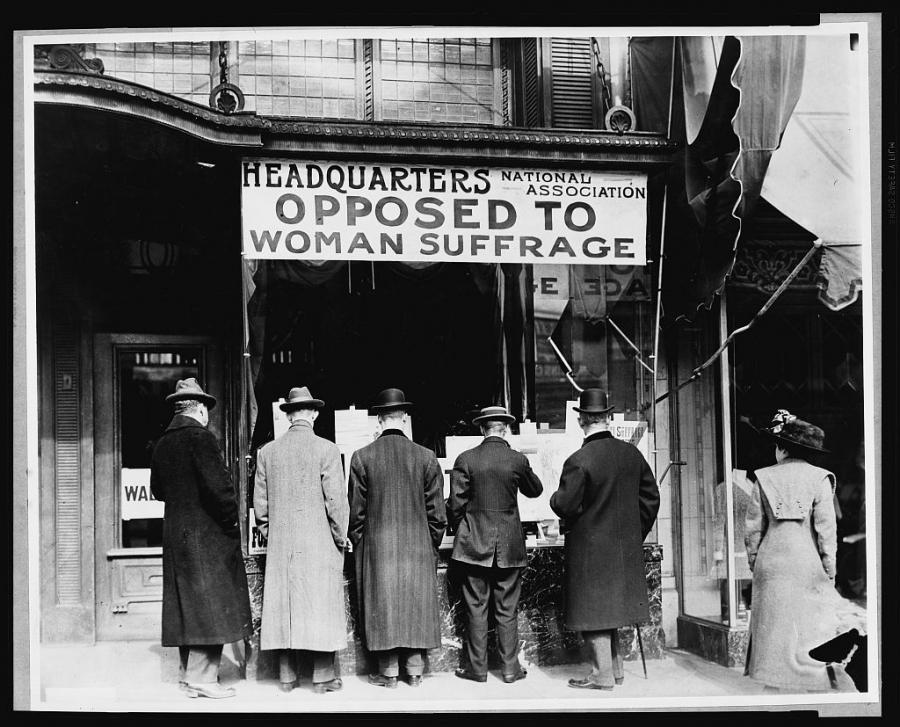
UPDATE: 11/8/16 6:30 PM EST
Shooting reported near California polling station
At least four people were shot by a heavily armed suspect in Azusa, southern California, officials told the Los Angeles Times. The paper reports that at least one victim has died. Follow the updates here.UPDATE: 11/8/16 5:45 PM EST
Stop right now! It's time for an election break
Phew. It's been a long day, right? Let's take a moment to talk chocolate.
Specifically, Toblerone, and their distinctive triangle-shaped candy bars originally from Switzerland.
The brand is owned by an American company now. And that company's just decided to change the way the triangles are spaced out in Toblerone bars for sale in the UK.
Sounds pretty arcane, unless you're a chocolate fanatic. Or if you're British and say, "Yes, I do mind the gap!" Indeed, the BBC reports that many Brits do.
It's easy to laugh at this story. But The World's Leo Hornak says there's something important about it. It's a sign of a new Brexit reality.
"This is about how real political and economic change affects your daily life. [In the US,] you're in the middle of a huge election and there will be all sorts of fanfare when your new president is announced. But it's actually when it affects you daily life, a few months or even years later, when you see things actually change in your shops. That's when it really changes people."
Hornak reflected on the referendum in which the UK voted to leave the EU.
"We had the fanfare. We had the referendum. We had the nail biting finish. But it's now, months later, that we actually are seeing things like tea bags changing in prices. Chocolate bars getting smaller. These are the real affects of how people vote on a big, big decision. And that is what is really starting to 'bite', if I can use that pun."
Yes, yes you can.
Hear the whole story here:
UPDATE: 11/8/16 5:15 PM EST
The Organization of American States is monitoring US elections for the first time
It's become a common refrain in this election to say “the world is watching.” But in one sense, it's literally true: The Organization of American States has deployed 41 international election monitors across the country to observe the US election.
The observers, invited by the US representative to the OAS, Kevin Sullivan, have been spread out across 12 states and Washington, DC, since early voting began. They are meeting with election and party officials, and are gathering data for a report on the fairness and accessibility of the election. The preliminary results will be announced on Wednesday.

It’s the first time the organization is monitoring US elections.
So, how is US democracy doing? So far, so good — with some caveats, says Gerardo De Icaza, the director of the OAS Electoral Cooperation and Observation Department.
“Are there things that could improve and coordinate better? Yes, and we will share some of those things in the final report,” De Icaza tells PRI. “Are those things a determining factor in the legitimacy of the election? I can tell you right away, no. These are things that can be improved. They should be improved. But they do not put into question the integrity of the election.”
Read more about the OAS mission to observe the US election here.
UPDATE: 11/8/16 5:00 PM EST
Harry Potter for president?
The tenor of this election has been dark. And it shows in many of the drawings our cartoon editor is spotting on Twitter today.
Take these two, which both have a Dark Lord-feel to them:
And then there's this one, which isn't exactly dark, so much as a critical indictment of how the American voters allowed the election to get to this point:
Perhaps cartoonist Rod Emmerson found the best way to describe his feelings:
UPDATE: 11/8/16 4:45 PM EST
The presidential election may all come down to the Latino vote
PRI's Rupa Shenoy doesn't think the United States understands the diversity of Latinos.
"That’s why I decided to spend Election Day and The Day After Election Day in San Antonio — the blue heart of a deep red state, home to liberal Democrats and new immigrants who are staunchly anti-Trump," she writes. "But it’s also home to the Alamo, where Latinos helped win Texas' independence from Mexico. Those are the rebellious origins of a nuanced Latino demographic that supports Trump and doesn’t identify with more recent Latino immigrants."
Read more of Rupa's reporting from San Antonio here.
UPDATE: 11/8/16 4:15 PM EST
Six degrees of immigration
Conservative commentator Ann Coulter made a curious comment yesterday: "If only people with at least four grandparents born in America were voting, Trump would win in a 50-state landslide."
It's hard to know where to begin in responding to this idea. But a crucial point is that a standard like this would eliminate Donald Trump himself from voting — his mother was an immigrant from Scotland — and some of his children.
How many Americans would actually be disenfranchised if we restricted voting to this degree? Of about 320 million people in the US, some 42 million are immigrants, while about 39 million people have one or more immigrant parents. So that's about 26 percent of the overall population. (If you're not familiar with it, this is a great time to start exploring the Migration Policy Institute's data hub and their frequently requested statistics section.)
But we're talking about excluding the kids of kids of immigrants, a figure that's a bit tougher to come by. A 2001 Gallup poll found that just 56 percent of Americans identify as third-generation, meaning their grandparents were born here.
So a decent guess would be that about half of the US population would be perpetually ineligible to vote if Coulter had her way.
Incidentally, Pew Research Center says that this year we'll have the most diverse electorate in our country's history. Much of that growth comes from new Hispanic and Asian voters. Since 2012, 60 percent of new Asian voters and 26 percent of new Hispanic voters were enfranchised by becoming citizens. Of almost 11 million new voters since 2012, more than two-thirds are not white.
Plenty of immigrants are nervous about the outcome of this election. Among them are young immigrants who came to the United States as children and received Deferred Action for Childhood Arrivals, or DACA. The federal program, implemented by the Barack Obama administration via executive action, grants them temporary legal status, renewable every three years. But the next president could either end the program or expand it. Donald Trump pledges to end the program, while Hillary Clinton would try to expand it.
Join us online tonight to watch results come in.
— Angilee Shah and Monica Campbell
UPDATE: 11/8/16 3:45 PM EST
What's happening at the polls?
Turnout is expected to be high across the country, especially among Hispanics. Hillary Clinton appears to be maintaining a slim lead over Donald Trump in important swing states.
There have been several reports of voter intimidation today. In Minneapolis, a multimedia producer at KARE11 said this happened to her after she finished voting early:
Meanwhile, in Arizona, school principals were reportedly told that controversial Sheriff Joe Arpaio's deputies would be "stationed around the valley for easy dispatch should there be any need for an officer." Voting rights activists say it's a move to intimidate.
In Arizona, a battleground state where immigration is a top issue, Google Trends reported the highest search interest in ballot trouble.UPDATE: 11/8/16 3:15 PM EST
For 32 years, Guam has predicted the president. This time, it's Clinton
The Electoral College doesn't grant electoral votes to US territories. That's why the votes from the island of Guam, where America's day begins, won't count toward the final tally.
But the island's straw poll has accurately predicted the results of the US presidential election for 32 years running. Polls in Guam have closed now, and this year, the island supported Hillary Rodham Clinton. With all 67 districts reporting, Clinton defeated Donald Trump 22,972 to 7,747, according to Tom Maxedon, news director at Public Radio Guam.
“We are looking at about 55 percent voter turnout,” Maxedon says.
Despite the fact Guam’s votes don't officially count towards the results of the election, Guam has historically had a higher voter turnout than the mainland United States. The island is home to three US military bases and a large number of current and former servicemembers. Read more about how Guam voted here.
UPDATE: 11/8/16 2:30 PM EST
What if Americans were forced to vote?
It’s been really hard for some Americans to make up their minds this election. Many undoubtedly will sit this vote out.
But what if we had no choice? What if, like in over a dozen other countries, we had a mandatory voting law?
Brazil’s law says voting is obligatory for every literate citizen between the ages of 18 and 70. It’s voluntary for those 16 to 18 or over 70. But military conscripts cannot vote.
The fine for skipping the vote may not sound so bad: about $1.50. But the knock-on effects can get pretty nasty. It has the potential of costing you a passport, a government loan, even certain jobs.
Many Brazilians are not cool with this rule. The World's Will Carless reported on it — check it out.
UPDATE: 11/8/16 2:10 PM EST
You know who’s enjoying this election? Cartoonists.
UPDATE: 11/8/16 2:00 PM EST
This Aleppo resident is watching the US election as a major battle looms for his Syrian city
As citizens across the United States cast their ballots, residents of east Aleppo are preparing for the worst. Many are anticipating a final push any day now by Syrian government forces and their Russian backers to retake the rebel-held part of the city.
Abdulkafi al-Hamdo, a teacher who lives in the east, shared his thoughts on Election Day: “How many times did Obama say ‘Assad should leave’? … We hope the coming American president will do more than he will say. Otherwise Assad is staying [longer] than all those people who say ‘Assad should leave.’”

“All the world is watching [the conflict in Syria], shedding tears, speaking, promising and leaving without doing anything as if they lack power to help,” Hamdo said. “We are convinced that our uprising not only was to liberate [us] from the dictatorship of Assad, but also to reveal the inhumanity of the international community who claimed themselves for years as the defenders of humanity.”
Related: What Trump and Clinton say they would do about Syria
Hamdo said of the rumored offensive: “We are sure that the offensive is coming. Today, tomorrow or the day after. They will make these areas hell. During this period, during the election, they will not miss a chance to take revenge. We know that America is the strongest country in the world, so they are the only ones who can stop it. Now they are busy.”
— Richard Hall in Beirut
UPDATE: 11/8/16 1:30 PM EST
Voting while Muslim
A few reports have surfaced on Twitter about the messages people have for Muslim voters (or voters they believe to be Muslim).
Advocates are encouraging people to tweet about negative experiences using the hashtag #IslamophobiaAtPolls.
Law professor Khaled Beydoun in Detroit, Michigan says that he saw a voter at his polling place wearing a T-shirt calling for a Muslim ban.
Jana Al-Akhras in Ohio said a fellow voter asked how long she planned to stay in the US while she waited in line to vote.
Sireen Zayed, who owns a hijab store with her sisters in Indianapolis, reported this variation on "Where are you from?":
In December, a campaign press release said: "Donald J. Trump is calling for a total and complete shutdown of Muslims entering the United States until our country's representatives can figure out what is going on." During the Republican National Convention in July, he said the US should “suspend immigration from any nation that has been compromised by terrorism.”
His comments didn't sit well with many Muslims. Even David Wright, known for staging armed protests in front of Dallas-area mosques, said Trump's plan went too far. “It’s inefficient, ineffective, and it opens the door for him to be labeled a racist and a bigot and it takes the spotlight off the actual concern, which is our safety and security. I don’t want someone like that running my country,” Wright told us in March.
But some good news out of Shoreview, just north of Minneapolis, Minnesota, where Trump stumped yesterday and criticized the state's Somali population: Activist Tamara Gray reports no issues while voting.
UPDATE: 11/8/16 1:15 PM EST
This election needs prayers
“Religious Twitter” is joining much of the rest of America getting caught up in Election Day fever.
Jesuit priest James Martin, who’s also the editor-at-large of "America," The National Catholic Review magazine, was one of many clergy members offering an election day prayer on Tuesday.
“God, I know that I don’t have to get angry,” Martin’s prayer begins. “I don't have to get worked up. I don’t have to get depressed. I just have to use my conscience and vote.”
But some Catholic leaders told people of the faith to vote against the Democratic Party’s nominee, Hillary Clinton, because she supports abortion rights.
On Sunday, one Catholic priest from a group called Priests for Life even put an aborted fetus on an altar in a dramatic gesture of support for the GOP’s candidate, Donald Trump.
Many Christian leaders, however, took to social media to emphasize the importance of participating in American democracy by getting out to vote. Michael Curry, the presiding bishop of the Episcopal Church, has said that voting is “a Christian obligation.”
Muslim Americans went to the polls with a new sense of urgency, thanks to Trump’s calls to ban Muslims from entering the United States, with some eagerly joining the hashtag campaign #MyMuslimVote.
In Texas, Simran Jeet Singh dedicated his vote for Clinton to some of his detractors.
And in Brooklyn, Yosef Rapaport tweeted about his personal motivation for getting out to vote.
UPDATE: 11/8/16 12:15 PM EST
Track the election results in real time
Graphiq has built this map, which will update as states are called tonight.
UPDATE: 11/8/16 11:45 AM EST
Understanding why many Americans want to close US borders
"Maybe American exceptionalism isn’t dead," writes The World's radio host Marco Werman.
"The world is watching the vote on Tuesday for a reason. The United States sets trends — whether they’re positive or not, whether the rest of the world likes them or not. And now the globe awaits news that either the US will continue to be a strong if flawed exponent of democracy, or whether it’s about to become something no one even here can quite imagine yet, with reverberations far beyond our shores."
But Marco says he's learned more this campaign season within US shores than he expected to. While reporting in Arizona near the Mexican border last month, interviewing a cattle rancher named Ed Ashurst, "I became aware of a blind spot in my vision as a reporter," he writes.
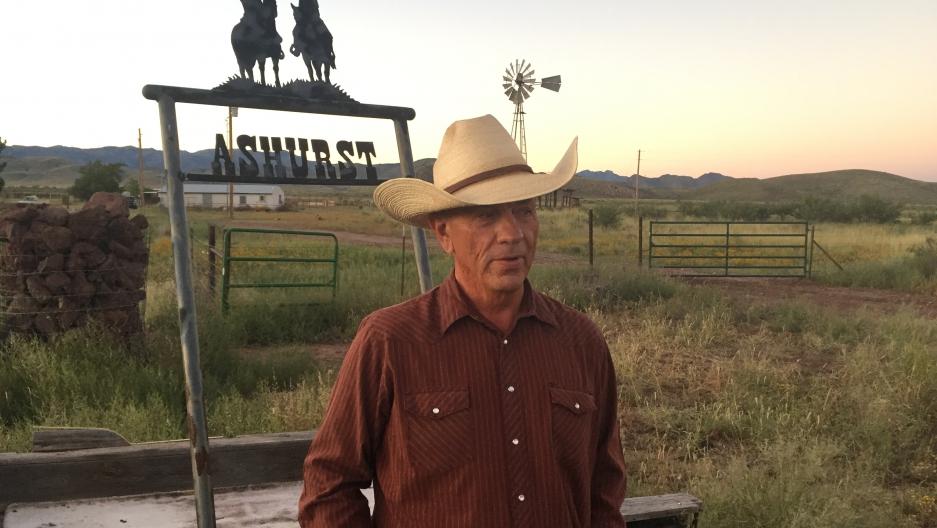
"Here I was covering the globe for the past two decades, constantly considering outsiders’ perspectives on the United States. But I was kind of forgetting to put myself in the shoes of Americans who are affected by events beyond our borders that are out of their control."
Ed Ashurst faces regular trespassing on his property by thieves and smugglers who cross the border in both directions. He wants to borders sealed up.
And the thing that really got through to Marco: "Ed believes that people like me, from another part of the country, don’t get what he’s going through. And he’s right."
Read Marco's full essay here, or listen to his interview with Ashurst:
UPDATE: 11/8/16 11:15 AM EST
Some election day traditions from around the world
Here's a tradition that's weird to a lot of the world: In the United States, we always vote on a Tuesday. When we could be doing it on the weekend, or even a special holiday. (Why? More here.)
But Americans aren't the only ones with odd electoral traditions. We've rounded up some voting-day practices from around the world that might make you go:
Here's one from Spain that actually started out as a Christmas tradition, but finds its way into political cycles, too. These, friends, are caganers. They're dual-purpose: symbols of "fertile" opportunity, and excuses to depict the world's most powerful people pooping. Thanks, Catalonia.
UPDATE: 11/8/16 11:00 AM EST
Jordanian passengers encouraged to visit the US 'while you're still allowed to'
Royal Jordanian Airlines is an early contender today for Best Election-Related Ad Campaign. Seeing other good snark out there? Tweet us about it @PRI.
UPDATE: 11/8/16 10:15 AM EST
Americans in Lebanon get ready for a long night
It's already after 5 p.m. in Beirut, Lebanon. Americans living there are stocking up on booze and coffee, and taking preparatory naps to make it through the long night ahead.
The first US polls close at around midnight Beirut time, and many Americans here are planning to see it through till the bitter end, which could be as late as 5 a.m. Wednesday, local time.
Alex, a writer from Michigan, is among those hosting a results watching party.
“I’ve watched both elections since I moved abroad in 2007 — 2008 from Cairo, 2012 from Khartoum. … It's a tradition to get together with some other Americans hardcore enough to stay up 'til the results are called. Which in my experience is most Americans abroad. I wouldn't be able to sleep anyway.”
So what’s it like to watch your country go through such a potentially transformative event from so far away?
“You can see a bit more clearly how the process keeps the rest of the world in suspense. When you're in the US it's easier to lose perspective on how much it impacts billions of people outside the country. Seeing how influential the process is makes the idea of not voting seem especially insane.”
— Richard Hall in Beirut.
UPDATE: 11/8/16 10:00 AM EST

Maanvi Singh, 25, lives in London where she attends university. She hears people at her school compare and contrast the US election to Brexit, in which the United Kingdom voted to leave the European Union. "I definitely see the similarities in terms of the discourse around Brexit in terms of immigration," she says. "And Brexit and the US elections have been really divisive."
Linna Lin is a first-time voter from China. She's an outreach worker for the Asian Pacific Environmental Network. She's undecided in her choice for president and feels very turned off by the negativity in the campaign. She's more concerned about California's propositions — specifically the one to end the prohibition on most bilingual education.

Luis Mancheno was once a refugee from Ecuador, but now he is a citizen voting for the first time. He says he is no longer a victim:
"I am an American and my vote is my voice," he says.
Here he is after voting on Tuesday:
Read more of Mancheno's story in an essay he wrote for us.
UPDATE: 11/8/16 9:30 AM EST
Thanks to legalizations, US weed is better than ever — and Mexico wants it
Let's just come right out and say it: A lot of people in the United States like marijuana, for a bunch of different reasons — to the extent that marijuana legalization is even a ballot measure in nine states. This graphic will live-update as those results come in:
In Mexico, drug cartels still benefit from smuggling huge quantities of "grass" across the border into the United States. But even if just one of those ballot measures passes on Election Day, it will impact the cartels' business.
Here’s where it gets interesting: Mexicans are now buying US-made marijuana. It’s better, stronger and in demand.
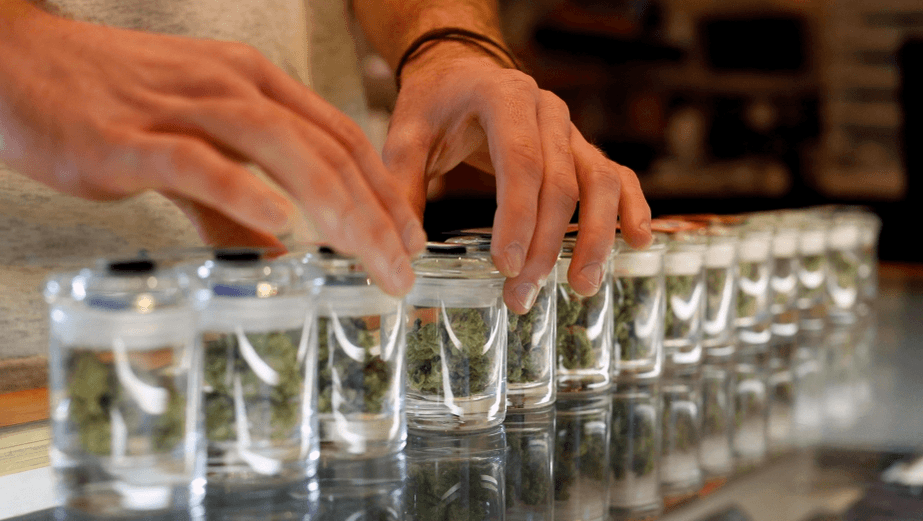
“There’s been anecdotal reports of boutique, very high-THC-concentration, marijuana being brought down from the US for sale in Mexico,” says Deborah Bonello, a senior researcher with InSight Crime, a group that monitors organized crime and security threats in Latin America. “Those products would be more expensive than your standard Acapulco Gold," Bonello says. "But there are people who are prepared to pay for it.”
Read the full story here.
UPDATE: 11/8/16 8:30 AM EST
In Southeast Asia, Trump’s fans include dictators and radical Buddhists
Cambodia’s leader is a harsh authoritarian who is famously corrupt. Apparently, he’s also a Trump fan.
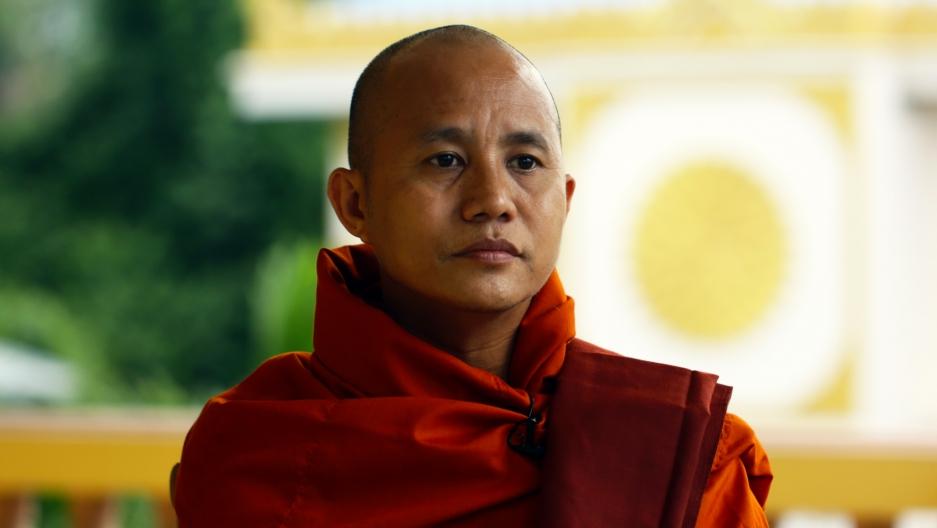
— Patrick Winn in Bangkok
UPDATE: 11/8/16 7:30 AM EST
View from France: Trump and Brexit are definitely connected
French reporter Laure Mandeville has recently been traveling around the United States to speak with American voters, and writing about her observations in Le Figaro. Mandeville is also the author of a book called, "Who Is Donald Trump, Really?"
Mandeville believes there is a clear connection between the rise of Donald Trump, the success of French nationalist leader Marine Le Pen, and the Brexit vote. All three, she says, have been part of a similar movement:
"It's a huge and very serious rebellion of the people against the elites."
The UK's Brexit champion Nigel Farage agreed, tweeting on Tuesday:
Mandeville says some voters in all three countries feel like their needs have been ignored. Immigration, globalization, and the decline of manufacturing jobs have also fueled a common fear — that people are losing their way of life. The issue of immigration in particular has touched a nerve.
"People see open-ended immigration as something that is going to change the heart of their country, and they don't want that," she says.
But Mandeville remains optimistic about the future of the United States, regardless of who wins the presidential election. A strong system of checks and balances, she says, will limit any president's power to dramatically effect change.
"I think your system and your country would survive even Donald Trump," she says.
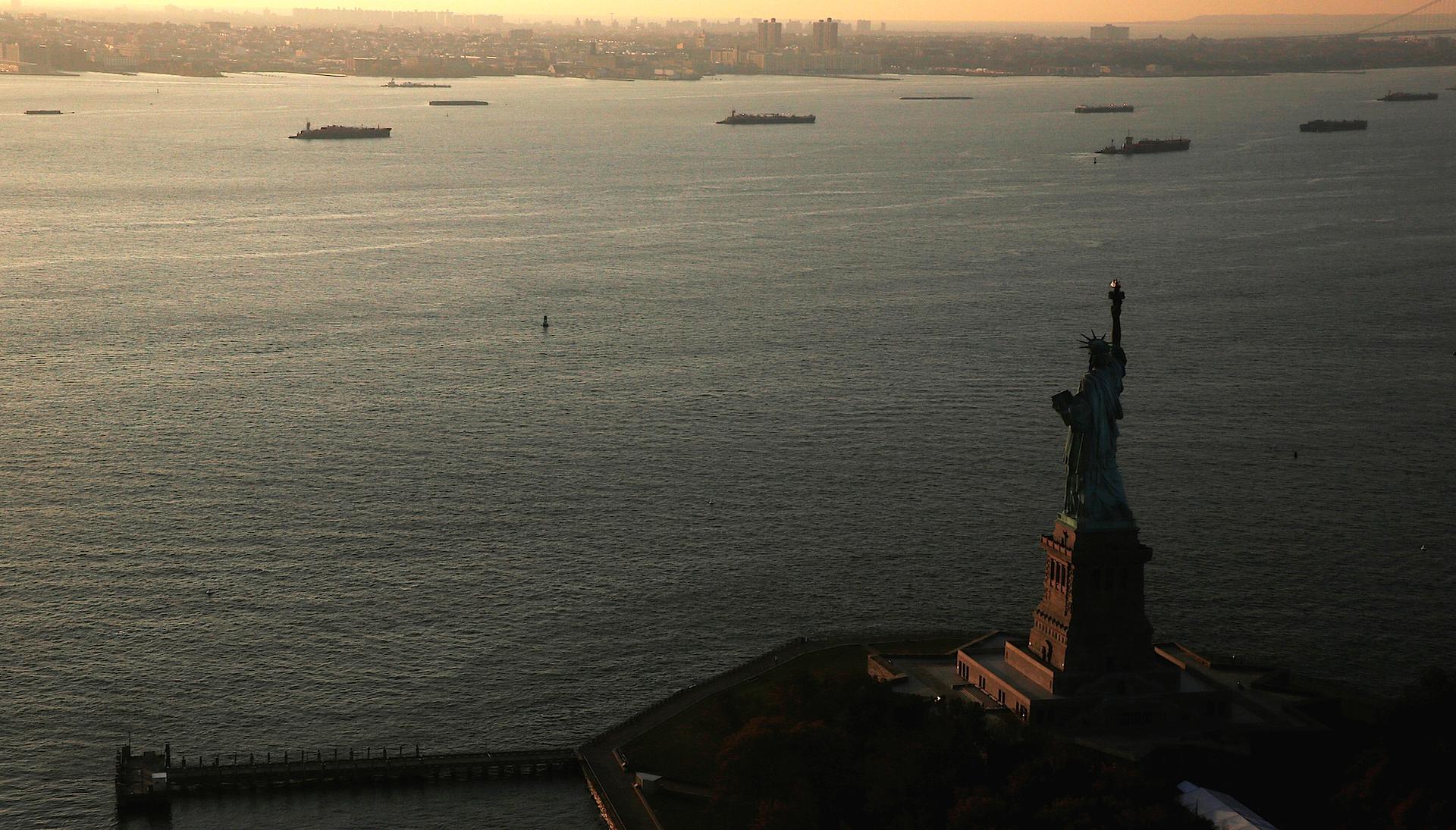
UPDATE: 11/8/16 7:00 AM ET
It's Election Day. Look out for Russian hackers.
Former CIA chief Leon Panetta is worried that Russian-backed hacking could peak on Election Day.
He told reporter David Rohde that he expects an overall disruption in the internet — the type of online slowdown Americans experienced in mid-October. Panetta told Rohde internet users are likely to see fabricated documents alleging voter fraud posted online.
"One scenario is you could have a higher number of votes cast, let's say in a predominantly African-American or Hispanic district, than the number of registered voters. That could all be based on a fake document showing those results," says Rohde, an investigative reporter for Reuters. "The hope there would be from the Russian side, that it would be picked up by the US media and political parties."
Panetta also warned that a final giant tranche of documents and emails hacked by the Russians could be released on voting day. Some of those documents might be fabricated, but there may be little time to verify them before many Americans cast their ballots.
"If there are strange things on Election Day, the public should sort of view them skeptically,” Rohde says. “Be patient and wait for final results and have faith in our institutions.”
The World is an independent newsroom. We’re not funded by billionaires; instead, we rely on readers and listeners like you. As a listener, you’re a crucial part of our team and our global community. Your support is vital to running our nonprofit newsroom, and we can’t do this work without you. Will you support The World with a gift today? Donations made between now and Dec. 31 will be matched 1:1. Thanks for investing in our work!
